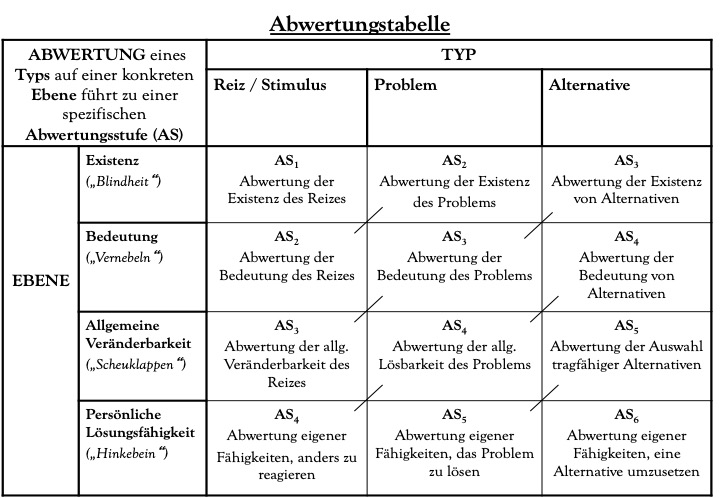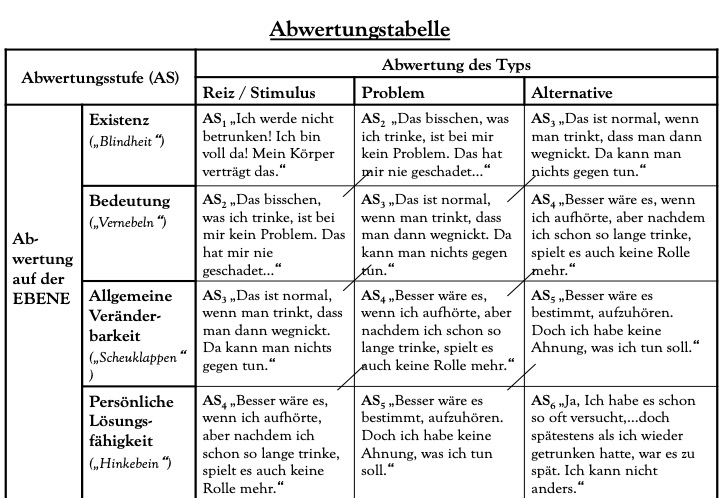INKOVEMA Newsletter
Mediation and conflict management
# 34
A. Key topics:
– Conflict potential addictions and dependencies
– The world of addictions: narcotics, work, internet, social media and much more.
B. Concepts for mediation
– Part 3: Application of the devaluation table in relation to the addiction problem of alcoholism
Conflict potential addictions and dependencies
- Addictions and dependencies are not only personal problems, but also massive potential for conflict.
- Addictions and dependencies are often the cause of escalating conflicts, neglecting joint projects and tasks or even causing them to fail.
- Addictions and dependencies can be the unnamed and unrecognised drivers, brakes and directors in conflict situations and mediations.
The classics: alcohol and other drugs (narcotics)
- Population-wide studies by the Federal Ministry of Health provide insights into the Distribution and extent of substance use in Germany. Here is a list and Links to these studies. Very interesting! Link
- Particularly topical and acute is the The problem of chrystal methwhich is unfortunately particularly easy to get hold of in Saxony, especially in the Ore Mountains – and is spreading from here to the whole of Germany. Time article // World article with overview map
- Information brochure „SEHN-SUCHT“ from the police for parents and carers on the subject of drugs and prevention. Download
- Alcohol in the workplace. How should colleagues deal with this? Link
- Drug abuse and poor medical care and protection lead to Declining life expectancy in the USAespecially in men. FAZ article // ZEIT article // Underlying study
Work until Morgengrauen…
- Knappes, informative Interview on workaholism – with Stefan Poppelreuter. download
- Detailed article on workaholism and its research. Link
- How can you become a workaholic? Link
- Am I workaholic? (with test) Link
- All social strata are affected. Link
- Comprehensive information in the network through the Swiss initiative „Crazy Workers“ Link
Internet, social media and smartphones – the drugs of modern times
- 10 characteristics of internet addiction. Link
- Self-test – How dependent am I on the Internet? Link
- Steep theses on the consequences of the Internet and Digital addictions Prof. M. Spitzer.Link (Video)
- Critical of the – in our opinion populist – theses of Prof Spitzer Interview with Prof Jantkewho specifically researches the topic
- „Internet Gaming Disorder“ (IGD) - Computer game addiction is currently the most intensively researched Internet addiction. There is also porn addiction, online shopping addiction and online gaming addiction, both of which have practically shifted from the offline world to the internet. There is also social media addiction and online dating addiction. All of these addictions have their own potential to spark or intensify social conflicts. It can be said for all of them that they are not addictive in themselves, but that there are biographical, neurological, familial and other influencing factors that can then lead to addiction. In other words, Internet behaviour is sometimes also a way of acting out pressure situations and stabilising existing problem behaviour. Link
- Also Social media behaviour must be learnt by children and young people so that it is not consumed irrationally. Link
Addicted to…
- …the perfect body (documentary). Link
- …Sport. Link
- …Cosmetic surgery. Link (It is particularly intense and part of good cultural behaviour in South Korea. Link)
- ..Lovewhich comes in two painful variants, as researchers at Cambridge University found in their 2017 analysis of several dozen studies on the subject. These studies are particularly helpful in Domestic violence in partnerships (see also the Newsletter INKOVEMA #33) especially the aspect of enduring them over a long period of time. Link // scientific source // dt. press article
- …addicted to Harmony…? …is the Question about the ability to deal with conflict. Link with self-test (Eric Hegemann).
Concepts for mediation
Part 2: Application of the devaluation table in relation to the addiction problem of alcoholism.







Leave A Comment